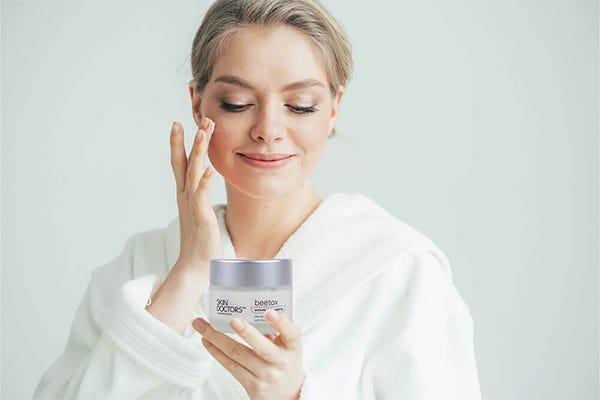What Is Dry and Dehydrated Skin?
Some days, you may find that your skin feels rough and irritable. It may seem to look flaky and dull as well.
Does this mean you have dry skin? Or is your skin just dehydrated? Is there even a difference?
Perhaps it’s just the weather affecting your skin? How do you treat it?
Dry and dehydrated skin can make us feel a little self-conscious. But there’s no need to stress.
Here is some more information about dry and dehydrated skin and how to treat it to restore your skin’s health.
Is there a difference between dry and dehydrated skin?
It’s very common to assume that when your skin feels dry, it’s suffering from dehydration too. That’s totally understandable, as these two share similar signs and characteristics.
However, dry skin and dehydrated skin are different skin concerns.
Dry skin is caused by a lack of sebum production generally due to genetics and ageing. Meanwhile, dehydrated skin is a skin condition caused by a temporary deficiency in moisture.
In other words, dry skin is due to insufficient oil production, while dehydrated skin is a lack of water.
The real difference is that dry skin is a permanent skin type that stems from inadequate production of skin’s natural oils. It does not vary, and it’s categorised as dry regardless of external factors.
Dehydrated skin, on the other hand, is a temporary skin concern often brought about by external elements that deplete the skin’s water content. People with oily and combination skin types can also experience this skin condition.
Knowing these differences will help you manage whichever problem you’re experiencing.
What are the symptoms of dry and dehydrated skin?
As stated earlier, dehydrated skin often shares the same signs as having a dry skin type.
The common problems you might be experiencing if you are dealing with dehydrated or dry skin include:
- Itchy skin
- Flaky skin
- Dullness and roughness of skin
- Appearance of lines and/or wrinkles
- Dark circles under the eyes
Apart from those signs, breakouts and oiliness of the face can also be symptoms of having dehydrated skin. This is because, when your skin is dehydrated, it produces more oil to compensate, and this can clog pores, leading to breakouts and irritation.
What causes dehydrated skin?
While dry skin is a direct result of a genetic skin-type, dehydrated skin is caused by external factors.
Are you wondering what can cause your skin to become dehydrated?
The following are common factors that diminish water content from within the skin:
- Environmental Factors – The level of humidity can affect your skin. Dry air and cold winds can strip water from your skin, leaving it with a flaky appearance.
- Too much sun exposure is also a factor. UV light is harmful to the skin and may cause erythema, irritation and inflammation.
- Hot Showers and Baths – Bathing in water does not rehydrate the skin – as a matter of fact, it does exactly the opposite. Hot water, especially, corrodes the protective top oil layer of the skin and accelerates water loss.
- Diet – Deficient drinking of water and not eating enough plant-based foods such as fruits and vegetables can have negative effects on your skin.
- Lifestyle Habits – These include drinking too much caffeine and alcohol, smoking regularly and a general lack of sleep.
- Skin Care Products – Your skincare regimen may trigger dehydration. Using low-quality products with harsh ingredients such as alcohol, retinol, menthol, and fragrance can drain your skin of necessary moisture.
How to restore moisture?
Luckily, dehydrated skin can be treated – there are available ways to restore moisture to your skin.
You can start by assessing your environment and see what kinds of conditions work for you. Perhaps you may try using a humidifier and reduce your use of air-conditioning, depending on the weather.
It is also advisable to use sunscreen (SPF50+) to protect your skin from harmful UV rays.
Another way of keeping your skin hydrated is by drinking lots of water and consuming water-rich fruits and vegetables that are beneficial in replenishing the skin.
You must also try lessening your intake of caffeine and alcohol and avoid smoking.
Most importantly, look for quality skincare products that suit your skin type and make sure they are also made of mild and gentle properties. Stay away from harsh face scrubs and start using moisturisers instead.
A facial moisturiser can work wonders on your skin, whether you have permanently dry skin or temporary dehydrated skin!
Try our Skin Doctors supermoist™ 24hr hydration product
Our supermoist™ 24hr hydration provides 450% more moisture for your skin in 30 minutes! It promises to make your skin plump, glowing and dewy every day.
Aside from that, Skin Doctors supermoist™ 24hr hydration offers additional benefits such as:
- Advanced moisturisation
- Intense hydration
- Combats the ageing effects of free radicals
- Illuminates the skin
Make sure to note that it is recommended for:
- All skin types
- Dehydrated skin
Fragrance-free, oil-free, lightweight moisturiser
Don’t forget to give your skin a little extra love by using a quality moisturiser once in the morning and again at night
For more information, visit our website: https://skindoctors.com.au/skin-doctors-supermoist-face
Related Products
1 Item
-
 Supermoist FaceOut of stock
Supermoist FaceOut of stock
1 Item




